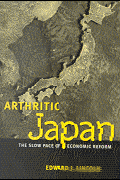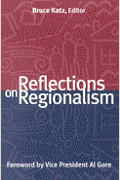Each week this summer a Brookings expert will post related to one of the 10 traits of globally fluent metro areas. These 10 traits below have proven to be particularly strong determinants of a metro area’s ability to succeed in global markets, manage the negative consequences of globalization, and better secure its desired economic future. This week’s post expands on trait 3 – Specializations with Global Reach..
Last week, the U.S. Department of Commerce released new data showing that 29 metro areas hit record export levels in 2012. Regional leaders need to treat this piece of news as more than arcane trade data at the margins of regional economic strategies.
Instead, “industry specializations with a global reach,” one key trait of globally fluent metro areas, must be at the heart of broader regional plans to boost global economic competitiveness.
The good news is that the best economic development professionals understand that traded sectors drive regional economic growth by drawing incomes from businesses and consumers in other markets.
Yet, too many regions still cling to an era where U.S. metro areas could fuel their economies by trading within America’s large and dependable domestic market. Greater Kansas City could sell their specializations in financial services or wireless communications to nearby Denver and Chicago and thrive.
A brutal U.S. recession and the rise of a powerful global consumer class have shattered that assumption. Simple math reveals the imperative for U.S. metros to extend their specializations globally. McKinsey estimates that customers in emerging markets will consume $30 trillion in goods and services by 2025, up from $12 trillion in 2010. The regions and sectors that ignore the expansion of global demand will likely lose market share and the very economic value that protects and adds jobs and opportunities at home.
Indeed, the new reality is that traded sectors must be exchanged worldwide if metro areas hope to successfully compete and prosper in today’s global marketplace.
So, what does it mean to nurture “specializations with a global reach”?
First, it is about exporting. While the new Commerce data showed promising trends in metro goods exports, the reality is that 86 out of the 100 largest metro areas still underperform the nation in the share of their economy driven by international sales. Metro areas need to proactively work with firms, service providers, universities, and other government and civic partners to help firms in their traded sectors enter international sales for the first time or to expand their sales to additional global markets. Regions like Portland, Minneapolis-Saint Paul, Los Angeles, and Central New York have active metro export strategies underway to grow jobs and boost incomes. These regions are demonstrating they have a unique and critical role to play in bringing firms into the export game and creating the overall ecosystem for global engagement
“Specializations with a global reach” is also about inbound investment. Regional leaders already have business recruitment strategies down pat. But in the future, metro areas must be more strategic in aligning foreign direct investment (FDI) with key specializations and integrating it with export strategies. A Brookings report on FDI in 100 U.S. markets will be released this fall.
Internationalizing specializations also helps firms and metros stay at the cutting edge of their fields. Global markets act as a natural selection mechanism in that only the most competitive sell beyond their home market. Firms that export find themselves adapting products and services to different global preferences, perfecting niche products, and improving time-to-market to better meet the demands of international customers. As they gain market share, firms acquire the resources to invest in next generation products and processes. In this way, going global helps keep regional specializations competitive or, if necessary, guide metros into new specializations (i.e. Silicon Valley’s evolution from semiconductors to software to social media).
Some regional leaders believe that global trade and investment is an activity best fit for coastal metros like Seattle and Miami or financial giants like New York that naturally think and act globally. That’s exactly the mindset that will relegate regions to flyover status or third-tier market status. The reality is that all metro areas, regardless of size and location, can and must engage globally.
Consider these markets playing on the global stage. Wichita, a region of just over 600,000, concentrates 32 times as much aerospace manufacturing employment as the rest of the country. Aircraft and parts built in Wichita are sold all over the world by Bombardier, Cessna, Hawker Beechcraft, and Airbus, and nearly 60 percent of Wichita’s exports derive from its aerospace cluster. The same can be said for interior metros like Minneapolis’s medical devices cluster or Indianapolis’s unique niche in chemicals. Similarly, the Greenville-Spartanburg area attracted more FDI per capita than any other U.S. region.
To be globally fluent is not simply about cultural literacy. The traded sectors that form a regional economy must themselves have international reach. And by going global, those specializations will only adapt and strengthen, solidifying a region’s place and dynamism on the global map.
The Brookings Institution is committed to quality, independence, and impact.
We are supported by a diverse array of funders. In line with our values and policies, each Brookings publication represents the sole views of its author(s).












Commentary
The 10 Traits of Globally Fluent Metro Areas: It’s Time for Regionally Traded Sectors to Go Global
July 15, 2013